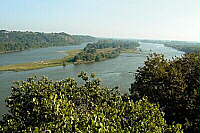 |
| Most of Europe´s major rivers flow through more than one country |
Water systems are under increasing pressure due to the continuously growing
demand for water for all purposes. In addition, climate change and an increased
focus on biodiversity have enhanced the necessity for sustainable and integrated
water management. These developments, combined with the establishment of
Water Framework Directive (WFD), have given momentum to the European Centre
for River Restoration and the role it aims to play. The need for exchanging
information and learning from each other exists on a pan-European scale.
The importance for Central and Eastern European countries is recognised
because they have to implement the Water Framework Directive as part of
the enlargement or approximation process. Most of Europe’s major rivers
are transboundary. Therefore, successful river basin management requires
a concerted effort and team work on the part of many countries.
At present, the network consist of about 350 members form nearly all European
countries. The exchange of experience between practitioners takes place
through newsletters, homepages and meetings (yearly study tour, conference
with pan-European coverage every four years, participation in seminars).
The 3rd International ECRR Conference on River Restoration is scheduled
to be held in Zagreb, Croatia, on May 17-21, 2004. Participants will enjoy
a high quality programme with a lively mixture of presentations, workshops
and discussions in a hospitable atmosphere. Of course, an excursion will
be part of the programme.
The ECRR facilitates and encourages the establishment of national networks
(so-called national centres), which function as a focal point for individuals
and organisations working on river restoration. The international ECRR and
the national networks complement and support each other.